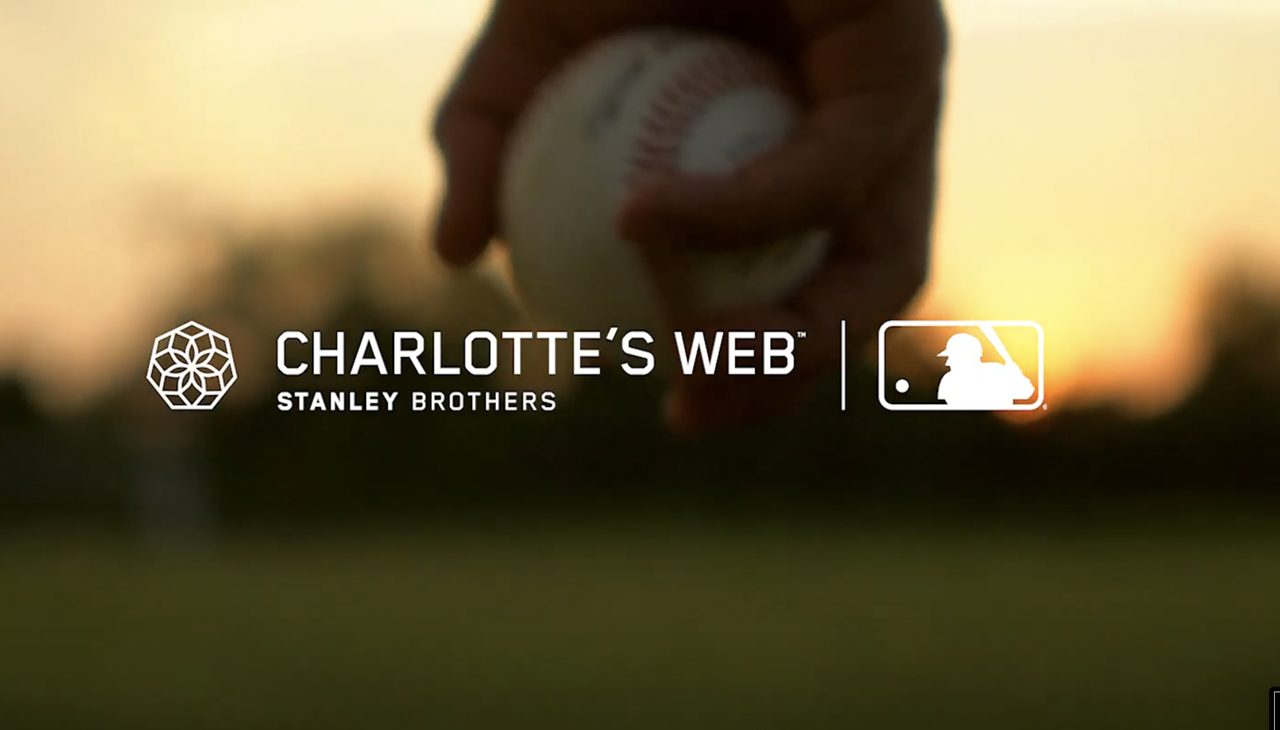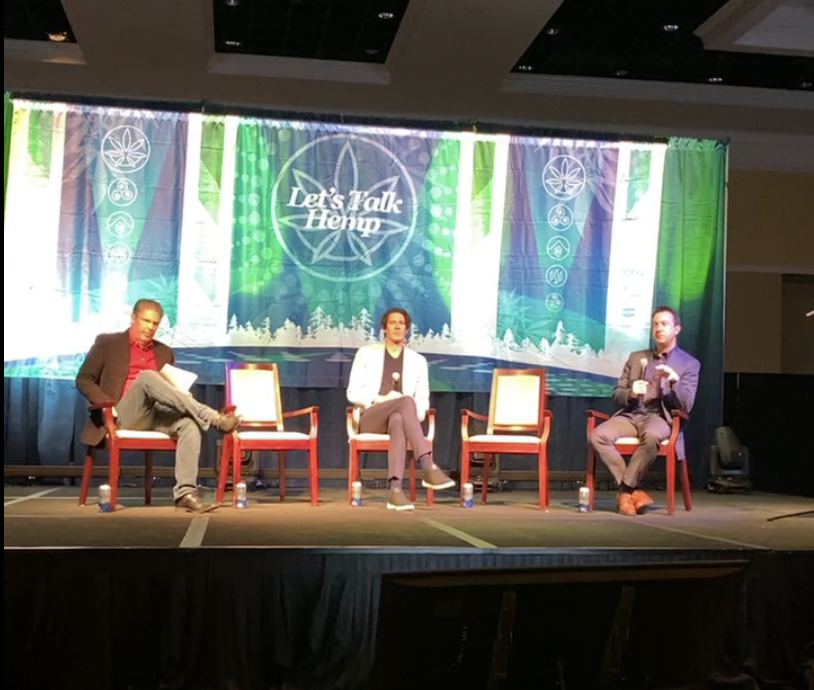
YouTube/Charlotte’s Web

Audio By Carbonatix
Of the four major professional sports leagues in the United States, Major League Baseball may be the friendliest toward cannabis.
In 2019, MLB was the first league to remove THC, CBD and other cannabis compounds from its list of banned substances, quietly allowing its players to use cannabis – as long as they don’t get caught, because cannabis-related arrests are still punishable infractions. MLB was also the first professional sports league to partner with a cannabis brand, announcing an agreement with Colorado CBD company Charlotte’s Web last October.
Both moves made waves across cannabis and sports, with the National Basketball Association and the National Football League relaxing their cannabis testing policies for players in the wake of the MLB move. According to MLB’s head of drug prevention and treatment, other sports leagues have contacted the league regarding working with the CBD industry, too.
Before all of that happened, though, a “few major steps” had to occur, according to Jon Coyle, MLB vice president of drug, health and safety programs, including the COVID-19 pandemic and the death of Tyler Skaggs, a pitcher for the Los Angeles Angels of Anaheim, who passed away from a drug overdose in 2019. During a public discussion at the NoCo Hemp Expo in Colorado Springs on March 29, Coyle and Charlotte’s Web co-founder Jared Stanley recounted how everything came together.
“We were kind of handcuffed,” Coyle said of MLB’s cannabis policy in 2018. The Farm Bill’s passage by Congress late that year legalized industrial hemp nationwide, which allowed the league “to start being thoughtful” about addressing CBD, but it was still a “slow-moving procedure,” he added. That movement was kickstarted in the summer of 2019, however, after the baseball world was struck by the death of Skaggs.
“That was, in my career of sixteen years, the hardest day,” Coyle said in front of the NoCo Hemp Expo crowd. “The good thing is that it triggered change in our own industry.”
A 27-year-old pitcher from Southern California who’d played for the Angels and Arizona Diamondbacks, Skaggs was found dead in his Texas hotel room after choking on his own vomit in July 2019. The coroner’s report listed a toxic mix of alcohol, fentanyl and oxycodone in his system. Just over three years later, a former Angels employee was sentenced to 22 years in prison for providing Skaggs the drugs that led to his overdose.
Skaggs’s death went “hand in hand” with “taking a different approach” to MLB’s cannabis policy and the league’s mental health services for players, according to Coyle. But months into those initiatives, the COVID-19 pandemic hit, and MLB underwent one of the most unusual seasons in its near-150-year history. Just sixty games were played in stadiums, all without fans, with off-field player activity strictly monitored to limit COVID outbreaks and game cancelations.
That paused CBD developments, but MLB’s work with public health organizations and league partners ultimately led to a more fertile situation for the Charlotte’s Web partnership, Coyle noted, including a keener eye on how players cope with the grind of a typical 162-game season, not counting spring training or the playoffs.
“That’s a lot of time on airplanes. Half of the time they’re away from their families, and they play on nationally televised games,” which can increase anxiety and stress and impact sleep patterns, Coyle said.
A non-intoxicating compound of hemp and marijuana, CBD has shown its potential to treat other illnesses and ailments such as joint pain, inflammation and anxiety. CBD products marketed as aids in athletic recovery are now one of the most popular sub-categories in the CBD sector, but approving a new substance from hemp, even if it is now legal, still took a lot of diligence from MLB and Charlotte’s Web.

NoCo Hemp Expo organizer Morris Beegle (left) holds a Q&A discussion with Charlotte’s Web co-founder Jared Stanley (middle) and MLB head of drug prevention and treatment Jon Coyle at the Broadmoor resort on March 29.
NoCo Hemp Expo
Professional baseball is no stranger to drug controversies, be they related to performance-enhancing drugs or the use of amphetamines in the clubhouse. “Our athletes are the most drug-tested people in the world, so they are extremely cautions about what they put into their bodies,” Coyle said.
Although the United States Food and Drug Administration still doesn’t regulate CBD, that hasn’t stopped the industry from topping $4 billion in sales this year, and professional sports are starting to follow the money. The only way MLB was willing to partner with a CBD brand was if the company’s products were certified for sports by the National Sanitation Foundation (NSF), a program that checks product ingredients and tests for unsafe levels of contaminants, prohibited substances or masking agents. That’s where the longevity of Charlotte’s Web, one of the most recognized brands in the space, came in.
Named after Charlotte Figi, a child medical marijuana patient, Charlotte’s Web rose to prominence as a high-CBD strain in the early 2010s. Figi and the strain appeared on Dr. Sanjay Gupta’s Weed documentary on CNN, helping ignite America’s interest and acceptance of CBD, a non-intoxicating compound found in marijuana and hemp. Figi, who passed away in 2020 at thirteen with COVID-19-related symptoms, suffered from a rare form of epilepsy. After being treated with CBD oil extracted from her namesake strain, however, she no longer required a feeding tube to eat, and her family reported that CBD had nearly eliminated her seizures.
As Charlotte’s Web gained national prominence, the seven brothers who’d developed the strain in Colorado Springs – Josh, Joel, Jesse, Jon, Jordan, Jared and J. Austin Stanley – launched a hemp and CBD company named after the strain, which became one of the most popular names in the industry.
Charlotte’s Web began planning a move into professional sports in 2017, according to Jared Stanley, and has been providing products for a university study since 2021, giving the company an understanding of the NSF’s requirements. The company initially planned to pitch the NFL on a CBD partnership, but made a “strategic pivot” when the MLB’s mental health initiative allowed more opportunity, he recalled.
Convincing MLB brass was one thing, the sixth-oldest Stanley brother explained, but players were a different obstacle. Referring to athletes and their trainers as “maybe the hardest group to gain acceptance with,” he said that Charlotte’s Web sent representatives to spring training facilities in Arizona and Florida
to educate players and answer questions about drug-to-drug interactions and the efficacy of CBD.
Coyle is optimistic that CBD oil can help the sleep and mental wellness of athletes, and said that CBD balms and cream for inflammation and pain could be provided to players in the future. The partnership with Charlotte’s Web has also led to more CBD advocacy in Washington, D.C., he noted, which was a big sticking point for the Stanleys.
“If the MLB can endorse the CBD category, then we’d better pay attention now,” Jared Stanley said, adding that he’s “seen more engagement from Congress” in CBD discussions over the past six months.
Although the namesake of Charlotte’s Web has passed away, the Figi family is still essential to the brand and CBD movement, Stanley noted, while Coyle acknowledged that the family’s story played a part in MLB’s decision to begin the partnership. Paige Figi, Charlotte’s mother, even threw out the first pitch at a New York Yankees playoff game last October.
“The reality is that Paige and Charlotte started this,” Jared said. “This is Charlotte’s legacy.”